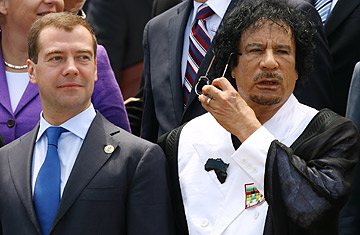
Russian President Dmitri Medvedev, Libyan Leader Muammar Gaddafi and the extended members of the G8 world leaders pose for a "family photo" on the third day of the G8 summit on July 10, 2009 in L'Aquila, Italy.
On April 5, a little-known Russian Senator and diplomat, Mikhail Margelov, published an article called "The Arab World Is Changing," in which he argued that Russia is well-placed to act as mediator in the war in Libya, but it should think hard about the political risks. "We have too much going on in our own country," he wrote. "We have elections coming up." Two months on, the junior diplomat is starting to look prophetic.
With the war at a stalemate and the West apparently out of options for negotiating a truce, the U.S. asked Russia last week to step in and try to convince Libyan dictator Muammar Gaddafi to make a deal. Not only did Russian President Dmitri Medvedev agree — with potentially huge political consequences — but he also made the surprise decision to send in Margelov, who barely has two months under his belt as Russia's envoy to Africa. "I am knocking on wood and crossing my fingers," Margelov told TIME while planning his departure on Tuesday. "But it's hard to guess what will happen."
In the best-case scenario, at least as the West envisions it, Gaddafi will finally cede power to the rebels, who rose up against him in February and sparked a civil war. But NATO's persistent bombing raids against Gaddafi's forces have failed to accomplish that in the past two months. On Monday, South African President Jacob Zuma also couldn't convince the colonel to go. It's hard to see how Margelov's chances would be any better, while the risks he alluded to in his April article have not gone away.
In the coming months, Medvedev will need to convince his political mentor, Prime Minister Vladimir Putin, to let him stand as a presidential candidate in the 2012 elections. That would get the support of Putin's political party, practically guaranteeing Medvedev a second term. "This is what is keeping Medvedev up at night," says Alexander Rahr, a Russia expert at the Berlin-based German Council on Foreign Relations.
But Putin, who is also considering a presidential run, has repeatedly stated that he wants nothing to do with the West's adventure in Libya, which he likened to a "crusade." The majority of Russians seem to agree. A survey released on March 24 by the state-run pollster VTsIOM found that 62% of respondents believe it is up to Libyans to resolve their own internal conflict and no other state should get involved.
So until last week, Medvedev kept Russia on the sidelines. In March, he abstained from voting on the U.N. resolution to allow the bombing raids against Gaddafi, and he even rebuked NATO in April for "seeking to abuse" the resolution's mandate by using too much force. But his position changed at the G-8 summit last week in Deauville, France. On May 27, he signed the summit's final declaration, which said Gaddafi "has lost all legitimacy" and must give up power, and he agreed to U.S. President Barack Obama's request to mediate in Libya.
This entails an incredible gamble. "If we succeed, we will build our political authority in the G-8, as well as the Arab world and Africa," Margelov, the negotiator, says. And if you fail? "Well, I don't think there is a chance of not succeeding," he says. "We have not burned our bridges with either Gaddafi or the rebels, and this is the wonderful product we have to trade on the political market."
There already seemed to be some dividends from that trade at Deauville, albeit meager ones. The U.S. offered $5 million for information leading to the capture of Russia's most wanted terrorist, Doku Umarov, and it gave Russia a contract worth almost $400 million to supply helicopters to the Afghan army. But aside from these gestures, the two sides made no progress in resolving their main dispute: the U.S.'s plans to build a missile shield in Europe, which Russia sees as a threat.
Rahr, of the German Council on Foreign Relations, points out that Russia may also be angling to grab a bigger piece of Libya's oil wealth once the conflict there subsides. Russian energy giant Gazprom has long coveted refining and pipeline deals in Libya. But even if Moscow manages to get them in the long term, Medvedev's involvement in Libya still opens him up to accusations of acting like a Western stooge ahead of the elections — about the worst insult a Russian leader can face.
So in Moscow, not everyone is radiating Margelov's optimism. Konstantin Kosachyov, head of the foreign-relations committee in the Duma, says if Russia fails to mediate the conflict, "we will be pulled into a situation we did not design." He adds, "It will not just be a failure of our diplomatic mission, but more broadly, we will share the responsibility of failing to resolve Libya's problems through external influence as a member of the G-8."
And the odds of success look slim. After Medvedev signed the declaration against Gaddafi at Deauville, it will be much harder for any Russian to seem like a neutral mediator. "Gaddafi will understand that Russia has no role to play here except as a postman for the West," says Rahr. That is not the image Medvedev wants while heading into these negotiations in Libya — or into next year's elections at home.
